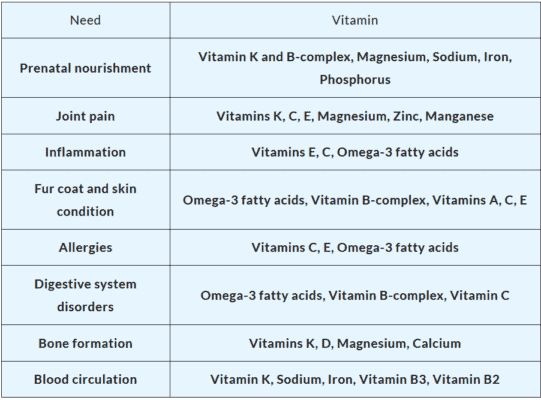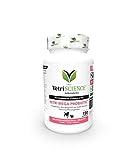Vitamins, minerals and additional supplements are a crucial necessity for every canine creature out there. Here you’ll find not only the ultimate guide to dog vitamins, but also the importance of each vitamin and mineral for your canine pal.
Dogs get their basic essentials from the well-balanced diet, which premium dog food items offer, but those canines being fed with human foods or table scraps are in fundamental need of additional vitamins.
Why do dogs need vitamins?
Just like human beings pups are in need of some additional boost in order to grow and thrive. The best dog vitamins and supplements aim at supporting nerve and muscle function, oxygen and blood circulation, formation of bone and cartilage. The lack of these necessities results in a vast variety of health related issues, some of which pose lethal danger to your pet.
The best dog vitamins and supplements aim at supporting nerve and muscle function, oxygen and blood circulation, formation of bone and cartilage.

On the other hand, too much vitamin supplements are rather unhealthy. For example, excessive amounts of Vitamin A can force dehydration, harm blood vessels and cause joint pain.
Too much calcium could easily cause skeletal problems in larger dog breeds, whereas too much Vitamin D can cause lack of appetite and muscle atrophy.
According to Dr. Susan Wynn, a DVM from Georgia, supplementing any dog with additional vitamins is completely unnecessary if said dog is already receiving everything it needs from a complete and balanced diet.
Which minerals and vitamins do dogs need?

There is a plethora of vitamins and minerals, which are present in natural food items that are an irreplaceable part of every dog’s dietary requirements. For example, fish, bone meal, beans, vegetables and wheat bran are rich in magnesium, calcium and phosphorus.
Sodium and chloride are found in tomatoes, beans, whole grains, meats, sweet potatoes and fish. Sulfur is present in eggs, meat, fish and molasses. If you wish to read further information on these minerals, PetMD offers an instructive article on the subject.
On the other hand, vitamins are just as crucial for dogs as minerals are. The B-complex vitamins are the most fundamental group of vitamins for every single dog. However, the rest must not be neglected.
Vitamin C and E reduce inflammation. Fatty acids help for healthier fur coat. Vitamin B3 helps for blood circulation, whereas Vitamin B5 is essential for the overall immune system. Riboflavin (B2) aids red blood cells and helps with skin, hair and nail growth. Vitamin K is of intrinsic importance for healthy liver function and bone formation.
Types of dog vitamins and minerals for four-legged friends

There is no ultimate answer to this question. Each canine is unique on its own and every dog has different nutritional requirements based on its breed, size, age, overall health and everyday diet.
The three basic types of supplements you can find for dogs are the following:
- Chewable
- Liquid
- Pills
The chewable vitamins often come in the shape of dog treats and have additional flavors and scents in them so that your canine pal will find them appealing enough to eat them.
Liquid vitamins can be added to the dog’s water bowl, while the pills can either be crushed into powder and mixed with the food or given separately prior to or after feeding.
There are also different types of supplements aimed at promoting different types of body functions depending on what the dog is lacking in its current state.
The best dog vitamins aim at helping with:

Need Vitamin Prenatal nourishment Vitamin K and B-complex, Magnesium, Sodium, Iron, PhosphorusJoint pain Vitamins K, C, E, Magnesium, Zinc, Manganese Inflammation Vitamins E, C, Omega-3 fatty acidsFur coat and skin conditionOmega-3 fatty acids, Vitamin B-complex, Vitamins A, C, EAllergiesVitamins C, E, Omega-3 fatty acidsDigestive system disordersOmega-3 fatty acids, Vitamin B-complex, Vitamin CBone formationVitamins K, D, Magnesium, CalciumBlood circulationVitamin K, Sodium, Iron, Vitamin B3, Vitamin B2
Prenatal vitamins
The prenatal stage is the most essential one in any living organism’s life. Pregnant canines need additional prenatal vitamins for them and for their unborn puppies. The overall dietary requirements of a pregnant dog are more demanding as the mother is in crucial need of an additional boost. Nourishment during the prenatal stage is absolutely vital for the pregnant dog, as well as for her pups.
The best natural dog prenatal vitamins for any breed are the B-complex and Vitamin K with the last being fundamental for bone formation. Additionally, phosphorus, sodium, magnesium and iron are substantial when it comes to cell production, blood circulation, bone strength and muscle function.
Natural Joint Vitamins for Healthy Pooch

Dog vitamins for joints play a key role for canines suffering from arthritis, but they also come in handy for senior dogs as their joints and bones become more vulnerable as their age progresses.
Vitamins K, C and E aid with joint pain.
Vegetables, seeds, plant oils, fruits, bran and leafy greens are rich in these vitamins.
Minerals such as magnesium, zinc and manganese are also key ingredients when battling joint pain. They can be found in foods like spinach, broccoli, leafy greens, whole grains and seafood. Administering dog vitamins to your elder canine or younger pup suffering from joint inflammation can severely improve its health and reduce its pain, which is why it’s essential to supplement your pet with them.
The best rated dog vitamins for joint pain are Nutramax’s Dasuquin and VetriScience’s Glyco-Flex supplements. Both of these are chewable dog treats.
Vitamins for inflammation
There are various reasons as to why you should battle inflammation in dogs, with the most dangerous one being that it can lead to cancer.
According to Dr. Karen Becker at the Healthy Pets, not enough Omega-3 fatty acids and too much Omega-6 fatty acids can increase inflammation in dogs and humans alike.
Apart from Omega-3 fatty acids Vitamins C and E also help against inflammation. Anti-inflammatory drugs can cure and prevent the numerous health risks, which chronic inflammation poses to your pet.
Vitamins for fur and skin

Dry or flaky skin, patched fur, dandruff, hair loss, shedding and matting are just some of the most common skin and fur problems that dogs are facing. The Vitamin B-complex is an irreplaceable supplement to your canine pal’s diet if you wish to promote soft, healthy and shiny fur.
Vitamins A, C and E are also essential dog vitamins for skin and fur.
Unsurprisingly enough, Omega-3 fatty acids, especially the ones found in fish oils and vegetable oils, are just as vital for your dog’s skin health as the above mentioned vitamins are. The commercially available Omega-3 fatty acids differ in their EPA and DHA concentrations. Thus, you should consult with a vet prior to administering this type of supplement to your pet.
Dog vitamins for allergies
Both the outdoor and indoor worlds are packed with tons of allergens, which pose danger to your dog’s overall health. Common allergies found in dogs can be triggered by fleas, mold, cigarettes, pollen, dust mites, and various food intolerances towards dairy products, soy, fish and chicken. Instead of paying for expensive allergy shots you can simply improve the doggie’s overall immune system with all-natural remedies like dog vitamins.
Vitamins C and E work wonders against allergies, skin and eye irritation or inflammation caused by said allergies. These vitamins help stabilize the allergen-antibody complex in the dog’s organism, thus lowering the risks of an allergic reaction.
Vet’s Best is a good choice for seasonal allergy
Dogs suffering from seasonal allergies can benefit from the Seasonal Allergy Support remedy by Vet’s Best, which comes in the form of tablets.
Vitamins for digestive system disorders
Vetri Mega Probiotic, Digestive Relief with Probiotics
Indigestion isn’t uncommon for dogs and even the healthiest breeds are prone to suffering from digestive system disorders. When your pup’s digestive enzymes are in need of a bit of a boost, the best options are Vitamin C and vitamins from the B-complex.
Additional supplements such as papain can also come in handy. Boosting the enzyme function of your doggie can remove toxins, balance cholesterol levels, improve nourishment absorption, balance weight and reduce heartburn and bloating.
You can opt for VetriScience’s best-selling Probiotic capsules for aiding the digestive tract health.

Bone formation vitamins
Administering bone formation vitamins is necessary even if the dog isn’t suffering from arthritis or bone fracture. Promoting bone strength is something on which pet parents should focus throughout the puppy’s entire lifespan ‘“ from the prenatal stage to the senior life stage.
Magnesium, Calcium, Vitamin K and Vitamin D are the best dog vitamins and supplements for bone strength and formation. There are various commercially available products for dogs, which focus exclusively on strengthening the bone structure.
Blood circulation
Balancing cholesterol levels, promoting blood circulation and boosting red blood cell formation are a necessity for every canine breed. Vitamin B2, which is also known as riboflavin, aids red blood cells, whereas Vitamin B3 helps with the overall blood circulation. Moreover, Vitamin K is also among the supplements that promote blood health.
On the other hand, sodium and iron should be used as supplements only in moderate quantities. Their deficiency can be just as harmful as their overdose.
Can dogs have human vitamins?
Even though human vitamins are considered safe for animals, if you wish to supplement your puppy with an additional boost, you should opt for products manufactured specifically for dogs. There are countless commercially available products packed with vitamins and minerals for dogs on the market.
Depending on your pup’s breed, size, age and overall health condition you should consult with a reputable vet before administering the correct dosage of vitamins or other supplements to your dog. Apart from getting minerals or vitamins focusing on aiding a particular section of the canine’s organism, you can also opt for administering multivitamins for optimal results.
When it comes to multivitamin supplements for canines, Pet MD’s Liver-flavored chewable tablets and Pfizer’s liquid supplement are ideal options for the support of your dog’s overall health.
Dogs have different nutritional requirements than humans do.
Their organisms cannot process any supplements the way a human’s organism would. As such, it’s essential to not give your dog human-based products and to stick only to additives, which are specifically manufactured for canines. You might think that your own vitamin supplements are safe for your doggie, but the only 100% pet-safe ones are those produced by reputable animal-orientated manufacturers.




